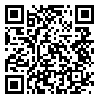BibTeX | RIS | EndNote | Medlars | ProCite | Reference Manager | RefWorks
Send citation to:
URL: http://jdisabilstud.org/article-1-2967-en.html
2- Assistant Professor, Department of Child and Adolescent Clinical Psychology, Science and Arts University, Yazd, Iran
Abstract
Background & Objectives: The epidemic of coronavirus disease and the implementation of preventive policies have had a tremendous psychological and physical impact on society, and in recent years, the prevalence of mental and psychological problems among young people has increased significantly. Some researchers have reported its rate among people under 20 years to be 75%. The results have shown that the onset of mental health issues between the ages of 12 and 24 is associated with several disorders that will continue for the following years of life. In addition, some have stated that issues and problems in the field of mental health are the main cause of physical diseases in teenagers and young adults. These problems have become more severe since the coronavirus disease epidemics began. Based on this, the present study was conducted to determine the effectiveness of treatment based on acceptance and commitment on coronavirus anxiety and death anxiety in adolescent girls with coronavirus.
Methods: The method of the present study was quasi–experimental with a pretest–posttest design and a control group. The statistical population included all teenage girls inflicted with coronavirus living in Yazd City, Iran, in 2021–2022. Of them, 30 volunteers were included in the study based on the inclusion and exclusion criteria. Then, they were randomly assigned to two groups of 15 people: experimental and control. The inclusion criteria were as follows: girls inflicted with coronavirus in Yazd City, participation in training sessions, participants' willingness and written consent, not suffering from psychological disorders and chronic physical diseases, not participating in other counseling and therapy groups at the same time, and ability to answer questionnaires. The exclusion criteria were as follows: absence of more than two sessions from the protocol sessions of acceptance and commitment therapy, lack of trust in the group, unwillingness to continue cooperation, not completing the questionnaires, not completing the tasks included in the protocol of acceptance and commitment therapy, and the therapist's diagnosis that the subject got hurt by the group. Data were obtained using the Corona Disease Anxiety Scale (Alipour et al., 2020) and the Death Anxiety Scale (Templer, 1970) before and after the implementation of the program Commitment and Acceptance Therapy (Hayes et al., 2011). The experimental group underwent Acceptance and Commitment Therapy during 8 sessions of 60 minutes (two sessions per week), and the control group did not receive any intervention. The data obtained were analyzed using descriptive statistics, including mean, standard deviation, frequency, and percentage, and inferential statistics using univariate covariance analysis and independent t test in SPSS version 23 software. The significance level of the tests was set at 0.05.
Results: Results of univariate covariance analysis showed that acceptance and commitment therapy was effective in reducing coronavirus anxiety (p<0.001) and death anxiety (p<0.001) in adolescent girls. According to the obtained value of the eta coefficient for coronavirus anxiety and death anxiety, it can be said that 0.337 of the variance of coronavirus anxiety and 0.417 of the variance of death anxiety was related to the effect of acceptance and commitment therapy.
Conclusion: Based on the results of the research, acceptance and commitment therapy affects reducing coronavirus anxiety and death anxiety. Therefore, this treatment program can be used to empower female teenagers and reduce the anxiety of coronavirus and death.
| Rights and permissions | |
 |
This work is licensed under a Creative Commons Attribution-NonCommercial 4.0 International License. |




